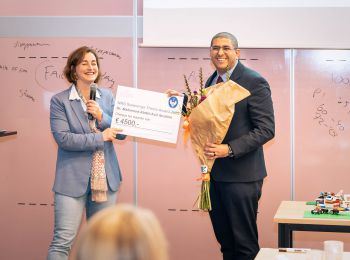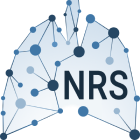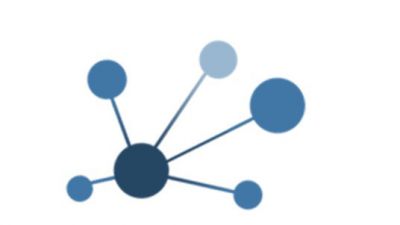Swierenga Thesis Award
The NRS Swierenga Thesis Award aims to promote and acknowledge outstanding scientific research that contributes to the understanding or treatment of lung diseases in their broadest sense. This award is made possible through the support of the Professor dr. Jaap Swierenga Foundation, which collaborates with the NRS to draw attention towards high-quality research in this field.
Have you defended your thesis or going to defend your thesis between 1 September 2023 and 1 September 2024?
Are you proud of your thesis?
Call for proposals have started for the Swierenga Thesis Award 2024!
Deadline application: 22 September 2024.
This year, the Swieringa Thesis Award is presented to two exceptional researchers in recognition of the outstanding quality and impact of their dissertations. Due to the equally high standard of both theses, the board has made an exception and decided to award the prize to both winners. Congratulations to the two winners of the 2024 NRS Swierenga Thesis Award, Dr. Esmee van der Ploeg, nominated by Prof. dr. Joachim Aerts (UMC Rotterdam) and Dr. Sacha Spelier, nominated by Prof. Jeffrey Beekman (UMC Utrecht). Esmee van der Ploeg: An outstanding dissertation that includes three publications in leading journals. Esmee utilized a diverse range of techniques and analyzed several cohorts of asthma patients, gaining significant insights into the roles of ILC2 and CD8 T cells in allergic airway inflammation. These cell types appear to be central players in steroid insensitivity, one of the greatest clinical challenges in asthma treatment. Her translational research provides clear direction for future studies on steroid insensitivity, with its potential impact expected to unfold over the long term. Sacha Spelier: Sacha's dissertation has a strong focus, addressing CF patients who do not respond to recently developed therapies with impressive clinical efficacy. This group represents 10-15% of CF patients. She employed a wide array of strategies and research methods, culminating in an exceptional general discussion that demonstrates her clear vision for her research. The impact of her work is highly promising, as it specifically targets therapy development for difficult-to-treat CF patients.
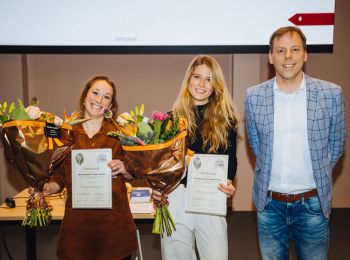
Congratulations to the winner of the 2023 NRS Swierenga Thesis Award, Dr. Xue Manz, nominated by Prof. Harm Jan Bogaard (Amsterdam UMC). Who according to her promotor, next to her exceptional research and lab skills, "she is one of the most generous and helpful colleagues, contributing to many projects in the lab". Title thesis: Inflammation and endothelium-platelet interaction in pulmonary thrombosis. Her Approach: Developed a unique microfluidics model to study pulmonary thrombosis: 'thrombosis on a chip'. Main Findings: Patients with CTEPH (chronic thromboembolic pulmonary hypertension) secrete excess of Von Willebrand Factor (VWF), reflecting epigenetic modification of the vWF gene promoter.
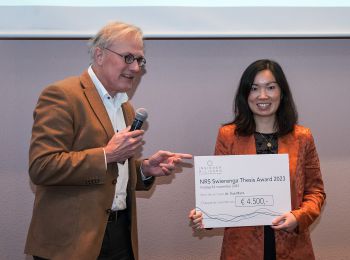
JURY REPORT SWIERINGA AWARD General All three submissions were of very high quality, both in terms of content (with many new insights highly relevant to health), methodology (state-of-the-art technology), and structure and presentation. In the end, the jury selected the thesis of Mahmoud Abdel-Aziz Ibrahim, which effectively places the described research in its context, with a clear vision for its application in patient care and diagnostics, as well as urgent unresolved research questions. Mahmoud Abdel-Aziz Ibrahim Omics-guided precision medicine: microbiomics and breathomics in asthma phenotyping January 19, 2022 New Insights into Respiratory Health and Disease In adult patients with asthma, patient clusters or phenotypes could be distinguished based on the analysis of sputum microbiome, transcriptome, proteome, and eicosanoids. The findings demonstrated that a multi-omics approach: Can help unravel underlying biological processes. Can contribute as a biomarker to characterize different asthma phenotypes. Can contribute to determining the risk of SARS-CoV-2 infection and/or morbidity. Characterization of exhaled breath profiles using eNose technology in asthma patients allowed for a reliable distinction between: Atopic and non-atopic patients. Asthma patients and healthy controls, independently of a rhinovirus challenge in a longitudinal study. Therefore, eNose analysis is a promising non-invasive method for asthma phenotyping and patient monitoring. The Societal Relevance of the Research Question The societal relevance of the research is significant. Asthma is a common respiratory condition with a highly heterogeneous clinical presentation. Many of the underlying biological mechanisms are still unknown, making the classification of asthma, a prerequisite for the development of precision medicine, very challenging. This thesis provides many starting points for valuable asthma phenotyping. Originality of the Research Method The technology used is state-of-the-art, utilizing multi-omics data and eNose profiles, processed through machine learning, to distinguish various patient groups, such as atopic and non-atopic. In summary, both the introduction, experimental chapters, and the general discussion of the thesis testify to the exceptional scientific quality, dedication, and independence of Dr. Andel-Aziz. Anneke ten Brinke, Reinoud Gosens, Rudi Hendriks November 30, 2022
